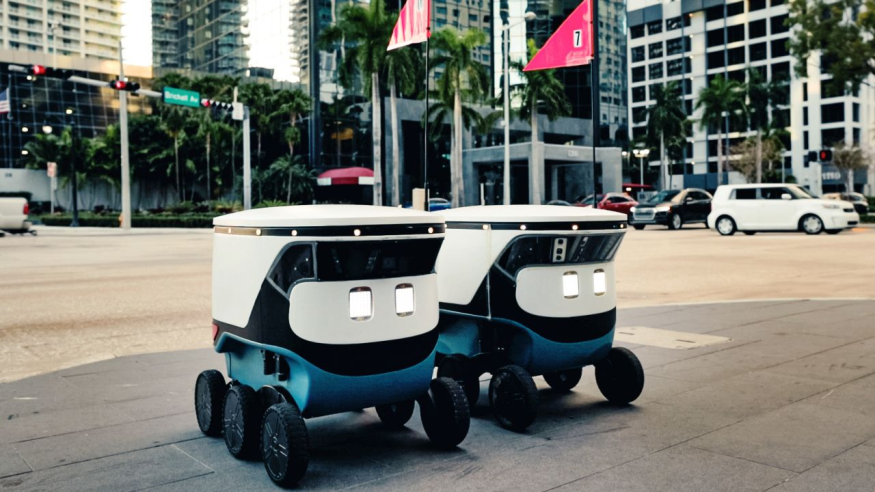Uber is collaborating with Cartken, a California-based company that makes sidewalk robots, to test a fleet of delivery robots in a commercial area in Miami called Dadeland. These robots will be used to deliver food from Uber Eats and replace human drivers. This pilot program has the potential to significantly impact the food delivery industry and the gig economy if successful, but it may face logistical challenges. Previously, Uber soldo its self-driving car business.
According to Christian Bersch, the CEO of Cartken, the partnership with Uber presents an opportunity to utilize the benefits of robotics in food delivery, ultimately leading to the creation of more connected communities. Through the use of these delivery robots, it is expected that traffic congestion will be reduced, local merchants will be able to increase their delivery capacity, and consumers will receive fast, convenient, and emission-free deliveries.
Through the use of the new delivery robot service, customers will receive notifications when their food is on the way and will be instructed to meet the robot on the sidewalk to retrieve their order from a secure compartment. Customers will be able to unlock the vehicle using their phone, and also have the option to choose a courier for delivery instead of the robot if they prefer.

Sidewalk Delivery Robots
Cartken is a robotics company that specializes in the production of sidewalk delivery robots. These robots are currently used for neighborhood food and grocery delivery, campus meal delivery, and curbside pickup. Cartken claims that its robots are the safest and most reliable in the market due to the use of AI-powered automation. They work with partners in a business-to-business relationship, allowing the partner to maintain the consumer relationship. The team at Cartken includes former Google engineers and operators with expertise in self-driving cars, AI-powered robotics, and delivery operations.
As per CNN, the delivery robots produced by Cartken are equipped with multiple sensors and cameras to help them avoid collisions and select the safest routes. They can operate both indoors and outdoors and have six wheels. The food delivery service using these robots will initially be available in the Dadeland area of Miami-Dade County, with plans to expand to other areas of the county and additional cities in the future.
Uber is not the only company in the US to use delivery robots. Both Walmart and Amazon have also implemented their fleets of delivery robots in the past. However, Amazon ended its testing of home delivery robots in October due to declining sales.

Corporation's Collaboration with Innovation
Uber's partnership with Cartken to test delivery robots is just one example of the company collaborating with external firms to offer futuristic, automated technologies. Previously, Uber also partnered with Motional, a driverless technology company, to offer autonomous vehicles in Las Vegas. In a statement, Noah Zych, Uber's global head of autonomous mobility and delivery, described the collaboration with Cartken as a significant milestone in the company's efforts in the development of automated and autonomous technology.
By partnering with other companies to develop and test autonomous technologies, Uber may be attempting to reduce its reliance on its large network of independent contractors who provide ride-hailing and food delivery services. This business model has faced legal challenges for the company in the past. However, Bersch highlighted the potential benefits of the new partnership, including the reduction of traffic congestion and the ability for local merchants to increase delivery capacity through emission-free delivery options.
In June, Cartken partnered with Grubhub to bring robot deliveries to some college campuses in the United States. The partnership with Uber marks the first time that the company has worked with an on-demand delivery app outside of college campuses. This collaboration is another example of major corporations seeking ways to minimize their reliance on human labor. Uber has had a controversial history of employing human drivers and has faced numerous legal challenges so the company would likely prefer to eliminate the need for them entirely.
RELATED ARTICLE : Robotics Surges in South Korea as New Law for Protecting Human Laborers Takes Effect, Will Machines Replace Workers?
Check out more news and information on Robotics in Science Times.
© 2026 ScienceTimes.com All rights reserved. Do not reproduce without permission. The window to the world of Science Times.












